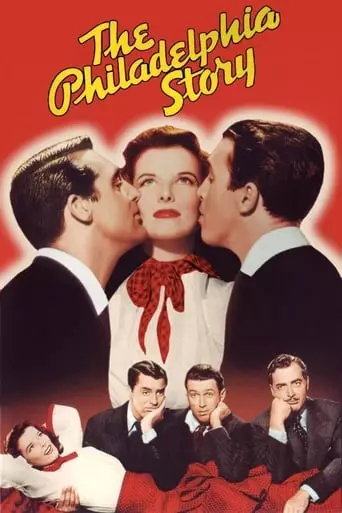When a rich woman’s ex-husband and a tabloid-type reporter turn up just before her planned remarriage, she begins to learn the truth about herself.
The Philadelphia Story (1940) is a classic American romantic comedy directed by George Cukor and starring Cary Grant, Katharine Hepburn, and James Stewart. Known for its sharp wit, sophisticated dialogue, and memorable performances, the film stands as one of the finest examples of screwball comedy and has had a lasting impact on the genre.
Plot Overview
The plot revolves around Tracy Lord (Katharine Hepburn), a wealthy socialite who is about to remarry a man named George Kittredge (John Howard). However, her plans are complicated by the arrival of two reporters, Mike Connor (James Stewart) and Liz Imbrie (Ruth Hussey), who are sent to cover her wedding for a magazine. Mike, a cynical and somewhat awkward writer, soon becomes enamored with Tracy, much to her surprise. Meanwhile, Tracy’s ex-husband, C.K. Dexter Haven (Cary Grant), reappears and stirs up old feelings. As the wedding day draws closer, Tracy is forced to confront her past relationships, the expectations placed on her, and what she truly wants out of love.
Analysis and Themes
- Class and Social Expectations: One of the central themes of The Philadelphia Story is the tension between class distinctions and societal expectations. Tracy is a member of the upper class, with all the privileges and pressures that come with it. The film contrasts her with Mike, a working-class reporter, and Dexter, a charming but flawed man from her past. The characters’ interactions expose the intricacies of social class and the way it shapes relationships.
- Personal Growth and Redemption: Throughout the film, Tracy undergoes a transformation. Initially portrayed as somewhat cold, self-centered, and perfect on the surface, Tracy’s character evolves as she recognizes the flaws in her previous relationships and the role her own pride played in their downfall. Her eventual decision to marry for love, not status or expectations, marks her personal growth.
- Romantic Comedy with Social Commentary: While The Philadelphia Story is undeniably a romantic comedy, it also offers a subtle critique of the upper-class lifestyle and the complexities of love and marriage. It presents a nuanced view of relationships, emphasizing the importance of personal connection over wealth and status.
- The Battle of Wits: The interactions between Tracy and her ex-husband Dexter, along with her growing attraction to Mike, are full of sharp dialogue and repartee. The battle of wits between the characters is a key feature of the film, with Tracy’s witty, independent nature clashing against the more traditional values of those around her. This dynamic adds both comedic and dramatic tension to the film.
- The Power of Self-Realization: At the heart of the film is the idea of self-realization. Tracy learns to let go of her preconceived notions about love and marriage and allows herself to be vulnerable. By the end, she discovers that true happiness lies in being true to oneself and embracing the imperfections of others.
10 Reasons to Watch The Philadelphia Story
- A Timeless Classic: The film is widely regarded as one of the greatest romantic comedies ever made, thanks to its brilliant dialogue, sophisticated charm, and compelling performances.
- Iconic Performances: The cast, particularly Hepburn, Grant, and Stewart, deliver some of their most memorable performances, with Hepburn’s sharp wit and Grant’s smooth charm making them an unforgettable onscreen duo.
- Witty Dialogue: The film is known for its clever, fast-paced dialogue, full of memorable one-liners and sharp comebacks, making it a joy to watch for fans of sophisticated humor.
- Chemistry Between Leads: The chemistry between Hepburn and Grant, as well as the developing tension between Tracy and Mike, provides a compelling emotional core to the film.
- A Unique Love Triangle: Unlike many romantic comedies of the time, The Philadelphia Story presents a love triangle with depth, where the characters are not merely competing for Tracy’s affections, but also for her personal growth and understanding of love.
- Charming Set Design and Costumes: The film’s elegant setting and stylish costumes add to its timeless appeal, with Tracy’s high-society world depicted in a way that is both glamorous and relatable.
- Mix of Comedy and Drama: While rooted in comedy, the film also explores deeper emotional themes of personal fulfillment and redemption, balancing light-hearted humor with moments of reflection and emotional depth.
- Strong Female Lead: Tracy Lord is a strong, independent woman who challenges traditional gender roles in romantic comedies. She’s no damsel in distress—she is fully capable of making her own choices.
- Social Commentary: The film subtly critiques class and social expectations, offering viewers an insightful commentary on the complexities of relationships and societal norms.
- Cultural Significance: The Philadelphia Story has had a lasting influence on the romantic comedy genre, paving the way for future films with similar themes of love, class, and personal transformation.
Emotional Reaction After Watching
After watching The Philadelphia Story, viewers are likely to feel a mix of joy and introspection. The film’s blend of sharp humor, romance, and character-driven drama makes for a satisfying experience. While the film’s comedic elements leave audiences laughing, its deeper themes about love, pride, and self-realization might also prompt reflection on personal relationships and societal expectations. Fans of classic cinema will appreciate the timeless appeal of the film, while newcomers may be surprised by its lasting relevance and emotional depth. Ultimately, The Philadelphia Story is a film that resonates with audiences long after the credits roll, leaving them with a sense of satisfaction, warmth, and a reminder of the importance of embracing authenticity in love.

